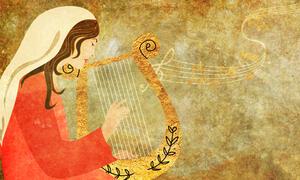How Serach bat Asher Became My Patron Saint
About five years ago, on a mother-daughter road trip, my mom misplaced her hearing aid. We retraced our steps to a diner in Virginia and, finding nothing in our booth from the night before, we started looking through the trash.
We were three garbage bags into the dumpster when my Jewish mother started praying to St. Anthony.
For Catholics, St. Anthony is the patron saint of lost objects. My mother had learned a version of the St. Anthony prayer from her Catholic coworkers: St. Anthony, St. Anthony, won’t you look around? Something is lost and must be found. To my horror, she proceeded to recite this prayer next to the dumpster.
Back in the car, Mom opened her backpack and found her hearing aid, resting on top of all the stuff she’d been rooting through all morning. To this day, she swears that St. Anthony put it there.
At the time, I turned my nose up at my mother’s novena as silly and superstitious (though I did wish she’d prayed to St. Anthony before we’d opened the first garbage bag!).
Then, a few weeks ago, I lost my journal.
I keep a small notebook with me at all times: part bullet-journal, part writer’s sketchbook. It contains my schedule, reflections on my day, snippets of bad poetry, and the occasional snarky thought. After ransacking both home and office, I mentally retraced my steps and came up with two possible theories:
1) I had left it at the DMV, and everything I’d written in the last six months was gone forever, or
2) It had gone missing somewhere in the synagogue, and everything I’d written in the last six months was now in the hands of a congregant.
I started hyperventilating. Suddenly, I understood the appeal of praying to St. Anthony; some crises are too small to bring before the Almighty, even as they loom large in our own lives. It must bring people great comfort to be able to address their more mundane prayers to the proper department.
Though my mother’s spiritual boundaries are permeable enough to make room for traditions from other faiths, I, an ordained rabbi, could not bring myself to pray to a Catholic saint. What, I wondered, would be the Jewish equivalent of praying to St. Anthony?
Had I Googled this, I might have discovered that there is a traditional, though not widely known, Jewish prayer for retrieving lost objects. But relying only on my own knowledge—which happens to be about 72% feminist midrash—my thoughts went to Serach bat Asher.
Serach bat Asher was the granddaughter of the biblical Jacob, listed in two biblical genealogies, 400 years apart (Genesis 46:17, Numbers 26:46). Because of her inordinately long lifespan, the rabbis ascribed magical powers to her. They say Serach was chosen to tell Jacob that Joseph was still alive—gently, while playing the harp, so as not to upset him—and for this, Jacob blessed her with eternal life (Sefer Ha-Yashar, Vayigash 14).
Serach pops up throughout rabbinic literature to solve mysteries and settle arguments. When Moses first arrived in Egypt with his message of redemption, the Israelites first checked with Serach to confirm that his claims were legitimate (Pirke De Rabbi Elieazer 48). Centuries later, as the rabbis debated what the Red Sea looked like when it parted, Serach appeared to say, “I was there, and it looked like lighted windows” (Pesikta de Rav Kahana 11:13).
There is also a story that, as the Israelites prepared to leave Egypt, they realized that earlier generations had promised to carry Joseph’s bones with them when they left. They didn’t know exactly where Joseph had been buried, so Moses asked Serach, the only person still living from that era. She told him that the Egyptians had sunk Joseph’s metal casket in the Nile. Moses then stood in front of the Nile and said, “If you show yourself, it is good, but if not, we are clear from your oath.” Joseph’s casket floats to the top of the water, and the Israelites are able to go forward (Babylonian Talmud Sotah 13a).
Clearly, Serach had played a role in uncovering what had been lost. So I prayed, not to Serach—I’m still a monotheist—but to the God of Serach.
God of Serach bat Asher,
Keeper of Secrets, Knower of Mysteries,
You who revealed Joseph’s bones in Egypt,
please reveal what is lost to me.
And, as I’m sure it gives comfort to Catholics when they pray to a patron saint, it put my mind at ease to send out a call for help to one of my favorite lesser-known women of the Bible. I also thought that maybe, if this prayer caught on, Serach and her story would get a little more attention than they usually do.
Other than that, I didn’t think anything would come of it.
But later that morning, I remembered writing down something my chevruta had said during our study session earlier that week. I once again attacked the pile of books on my desk, and found my journal.
It was buried between the pages of my Bible.









Lovely article! I chose the name Serach as my Hebrew name because she seemed very special to be the only female counted among the 70. Now I know a little more. Thank you!!
I love that the name Serach, if you rearrange the letters is "Search" -- seems fitting for the prayer for lost things! I was unfamiliar with the stories of Serach bat Asher, so thank you!
Oh my goodness- Is this the Rabbi Leah I know? I just wrote a comment and then looked at the author of the blog entry.
I absolutely love this and will share it with my woman's group. I too learned from my Greek friend to "pray" to St Anthony to retrieve lost things. Of course, she added a knot tied in a scarf so as to confuse the devil. I amad to now have one of my favorite women of the Bible to pray to!!!
Beautiful Story!
i love your inner conversation, Leah ❤️